“Israel indeed has a salient interest in preserving the strength of the Kurds and the additional minorities in the north Syria area.” This, according to Israeli Deputy Foreign Minister Tzipi Hotovely in a speech to the Knesset plenum. While underscoring Jerusalem’s support, Hotovely referred to the Kurdish-led forces as “moderate and pro-Western elements,” maintaining that they have “proven their utility many times over the years, especially during the fighting against ISIS.”
The Deputy Foreign Minister stressed that “The possible collapse of the Kurdish hold in north Syria is a negative and dangerous scenario as far as Israel is concerned,” as “It is absolutely clear that such an event would bring about a bolstering of negative elements in the area, headed by Iran.” She further revealed that the Jewish State granted the Kurds with assistance, mainly in the diplomatic and humanitarian spheres, to help alleviate their distress, during the month-long Turkish cross-border incursion, through a range of channels. “Since the beginning of the Turkish invasion of north Syria,” she said that “Israel has received many requests for assistance mainly in the diplomatic and humanitarian realm; following the killing of hundreds of civilians, the wounding of thousands and the uprooting of hundreds of thousands of civilians.” “We identify with deep distress of the Kurds, and we are aiding them through a range of channels,” said the Israeli diplomat.
While Hotovely did not elaborate on the assistance provided by Israel, she revealed “The reality we find ourselves in is still an emerging reality following the American agreement (with Turkey). There is a dialogue with the Americans, Knesset member Hauser. We state our truth in the diplomacy rooms regarding the Kurds,” underscoring that Israel is “proud of our taking a stand alongside the Kurdish people – really, there is a moral stand here.”
It is important to note that the Israeli assistance to the Kurds of northern Syria is aligned with Jerusalem’s decades-old policy. Since the late 1950s, the Jewish State has maintained discreet ties with the Kurds in the military, intelligence and business sectors.
Some believe that the Kurdish-Jewish alliance stems from events that occurred more than a thousand years ago in 1187; when the Kurdish leader of the time commonly known as Saladin led the Muslim armies against the Crusaders who controlled the Kingdom of Jerusalem. According to documented historical manuscripts, Saladin permitted Jews to resettle in the city after it was conquered by the Islamists – consequently founding a centuries-long friendship between the Jewish and Kurdish people.
